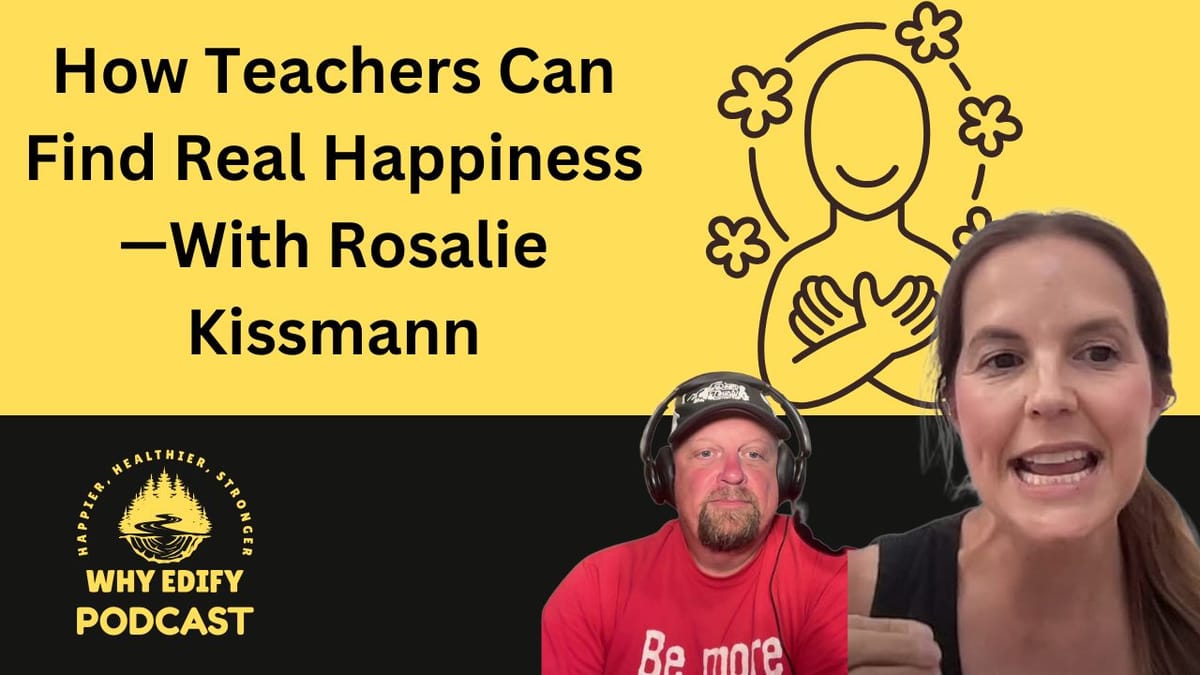Rediscover Happiness in Teaching: 3 Proven Tips from Happiness Expert Rosalie Kissman
Learn how to embrace joy in your classroom with actionable tips from educator and happiness coach Rosalie Kissman.

Every teacher knows the feeling: you walk into our classroom, coffee in hand, ready to inspire—but by the end of the day, you’re drained. What if you could carry a sense of happiness and resilience with you, even on tough days? In the latest Why Edify Podcast episode, I spoke with veteran teacher and motivational speaker Rosalie Kissman, who helps us reclaim joy in education.
Episode Summary (#66)
Rosalie brings 24 years of experience in elementary teaching and a passion for promoting happiness. Her journey into motivational speaking stemmed from her struggles and deep curiosity about how to remain happy throughout life’s ups and downs. From imposter syndrome when stepping on stage to learning powerful lessons about honest communication, her story is a testament to growth and courage in the classroom.
Watch or listen below, and continue reading to discover actionable steps that teachers can take to increase their happiness.
How Teachers Can Find Real Happiness—With Rosalie Kissmann
Three Actionable Tips for Teacher Happiness
1. “Embrace the Privilege Mindset—Even on Hard Days”
Rosalie’s assistant principal once told her, “You get to do this tomorrow,” a subtle but powerful reframe that stuck. In the middle of 2020’s chaos, masked faces and constant uncertainty, this shift in language offered a grounding truth: teaching is not just a responsibility—it’s an opportunity.
We all have days when exhaustionstruggled to balance her desire to please her parent with overshadows inspiration. But reconnecting with the why behind our work can change everything. Try this:
- Start your day with a grounding reminder. Before stepping into the classroom, say: “I get to make a difference today.”
- Reflect on student impact. Keep a “joy journal” with notes, drawings, or quotes from students that remind you why you started teaching.
- Use gratitude as a strategy. Acknowledge the challenge and the gift—gratitude doesn't ignore reality; it reframes it.
This mindset doesn’t erase burnout, but it helps you navigate it with a clearer heart.
2. “Choose Your Hard—Advocate with Courage and Compassion”
One of Rosalie’s toughest lessons came from a situation where a student needed hearing aids, but the family was hesitant. She struggled to balance her desire to please her parent with what was best for the child. The decision? To advocate anyway.
Her mantra: “Choose your hard.”
In education, we constantly face tough decisions:
- Speak up about a student’s needs, or avoid conflict?
- Set firm boundaries, or risk burnout?
- Push for equity, or stay silent for comfort?
Rosalie’s advice:
- Lead with empathy. Start hard conversations with shared values: “We both want what’s best for your child.”
- Trust your gut. Years of experience have given you intuition—don’t discount it.
- Stand in truth, not tension. When advocating for a student, focus on facts, options, and support—not personal opinion.
These conversations may be uncomfortable, but they lead to trust, clarity, and growth—for students and families alike.
3. “Honor All Emotions—Theirs and Yours”
Rosalie’s favorite teaching from Dr. Becky Kennedy’s Good Inside is this: we don’t need to be the “happiness police.” Kids (and adults) don’t need their feelings fixed—they need to be seen.
Instead of rushing to distract, dismiss, or “cheer up” a student (or yourself), Rosalie recommends:
- Validate the feeling. “That sounds really hard. I’m sorry you’re going through this.”
- Invite reflection. “Tell me more about what’s making you feel that way.”
- Sit with it. Don’t rush to fix the discomfort. Emotions teach us things. Let them have a seat at your table.
In Rosalie’s words, “Every emotion gets a name card at the table. They’re all welcome—but they don’t all stay forever.”
Practical classroom application:
- Use morning meetings to normalize emotional check-ins.
- Model emotional honesty—when you’re having a rough day, let students see that it’s okay not to be okay.
- Teach students emotional vocabulary to express themselves clearly.
This approach doesn’t just support students’ well-being—it protects your own. When you stop trying to carry or correct every emotion, you make room for real connection.
Rosalie reminds us that “two things can be true at once”—your work can be exhausting and deeply rewarding. By practicing gratitude, honest communication, and emotional presence, we can reclaim joy even during our toughest days.
❓ Reflection Question:
What “privilege moment” in your classroom reminds you why you love teaching?
❤ Enjoy this Article?
🍵 Show Your Support and 🤗 Share It



